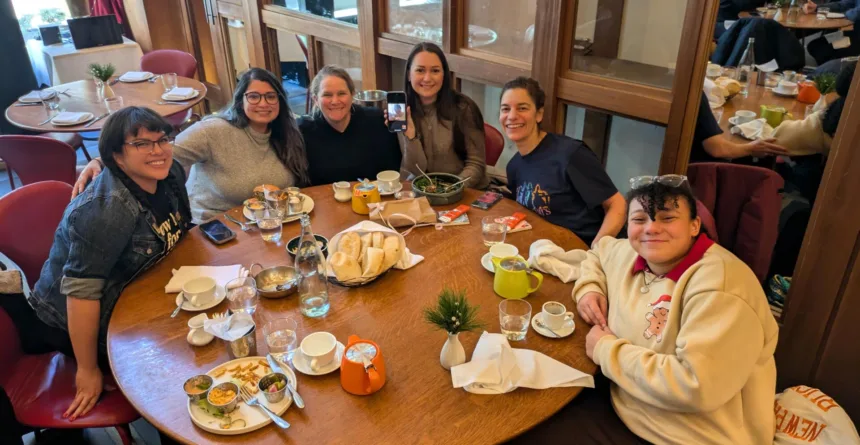Great Expectations!
March 29, 2023

Stop the Clock!
There’s Never Enough Time
Creating deadlines is a ritualistic practice in society. Following a timeline has become ingrained in everything we do, on a daily basis and in our future planning. We have learned that we are supposed to eat three meals a day, work or go to school, and set alarms to wake up and begin the day again – in hopes that we have achieved 8 hours of sleep of course. Even within these daily structures, we constantly are faced with an influx of obligations, to finish projects and assignments, submit payments, attend meetings, send emails, and complete a number of other tasks all in a timely manner. While some are more organized than others about meeting these requirements, and our rituals may look very different, we all march to the beat of some kind of drum.
When we are not busy thinking about what we are supposed to get done in the next five minutes, we may be thinking about what we should be accomplishing in the next five years. Some may feel the pressure of graduating from school, finding a job, receiving a promotion, finding a life partner, having children, or retiring. Especially living in Western society, we are constantly faced with thinking about what we will be achieving next. This socially constructed timeline can also be an incredibly unfair expectation for many who do not have the same opportunities to meet these expectations. We are suddenly faced with impossible standards to reach, and comparing our lives to each other’s, which leaves us feeling a sense of failure every time we do not meet a socially imposed deadline.
External Factors Influence Our Timeline
As our society progresses, so do our expectations for what is considered an achievement and when. Over fifty years ago, women were faced with the expectation of marrying and having children before age thirty. Our perception of gender roles continues to shift and influences how many view their own individual timeline. Women now may choose to have children in their thirties, forties, or may decide not to have children at all. Societal expectations continue to adapt, as well as our own, although we may still be challenging many social standards and internalized beliefs. Culture also plays a role in how we view success, and culturally approved timelines become a factor in an individual’s future planning. We constantly are navigating outside perceptions when considering what we should be striving for in our future and it can be difficult to actually find meaning in our choices. These external pressures can deeply impact our self-worth and leave us feeling misunderstood and alone.
Tune Out the Noise
We may never be able to fully block out the messages we receive from society but we can mediate the ones we impose on ourselves. While creating our own deadlines for meeting goals can still be valuable, we can challenge the negative pressure we place on ourselves and reconsider our rationale for achieving certain goals. It may be helpful to ask yourself if you are really working to achieve something you want or what you feel expected to achieve. If you are unable to achieve a specific goal by a certain, time, date, or age, it is ok to feel disappointed, but consider how you can shift your focus. You may adjust when or how you will meet a goal, or if you want to set an entirely new goal. While it can be disappointing to not achieve a goal, there are also benefits to a change in our predetermined plans. When our plans become altered, we are forced to grow in our perspective and we may become more inclined to other opportunities.
How Gratitude Can Help
Another way we can prevent ourselves from becoming lost in future planning is through practicing mindfulness. We may not be able to control our future, but we can control our ability to self-regulate in the present, which can have lasting positive effects on our mental and physical health and set us up to make more well-rounded decisions later in life. One mindfulness technique that can help reground ourselves in the present is the practice of expressing gratitude. Gratitude is a feeling of fulfilment and satisfaction that we experience when engaging in meaningful ways of thinking and acting. Practicing gratitude can be both an external and internal process. We can experience gratitude when showing our appreciation toward others, such as holding the door open for someone or calling a loved one and letting them know we care about them. Gratitude can also be reflected inward toward ourselves, by showing kindness in our thought patterns and engaging in self-care.
Practicing a gratitude ritual can be one helpful way of blocking out overwhelming societal pressures. It can often be difficult to feel appreciative of our successes in the present when we are constantly made to feel that we should be achieving more. However, if we are unable to stop and take a step back from the ideal timeline we are working toward, we may never actually feel fulfilled. Gratitude is not always easy to feel, and sometimes we may have a more difficult time finding things to be grateful for in the present depending on other contextual factors. Reaching a feeling of gratitude requires effort, but just like any habit, the more we practice it the easier and more natural it becomes. One step you can take is to simply appreciate yourself in this moment, and recognize that you are worthy and your success is not determined by what you will achieve in the future, but by how you can perceive yourself right now. If you need support to chart your true course and tune out the noise, contact us.



